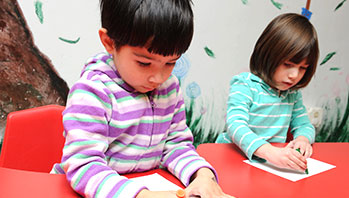- books (various genre/topics from Weeks 1 and 2)
- crayons or markers
- paper
MA Standards:
Literature/RL.PK.MA.10: Listen actively as an individual and as a member of a group to a variety of age-appropriate literature read aloud.
Speaking and Listening/
SL.PK.MA.1a: Observe and use appropriate ways of interacting in a group.
Speaking and Listening/SL.PK.MA.6: Speak audibly and express thoughts, feelings, and ideas.
Language/L.PK.MA.1f: Demonstrate the ability to speak in complete sentences.
Writing/W.PK.MA.1: Dictate words to express a preference or opinion about a topic.
Head Start Outcomes:
Approaches to Learning/Cooperation:Helps, shares, and cooperates in a group.
Logic & Reasoning/Problem Solving: Uses past knowledge to build new knowledge.
Language Development/Receptive Language: Attends to language during conversations, songs, stories, or other learning experiences.
Language Development/Expressive Language: Engages in conversations with peers and adults.
Literacy Knowledge/Book Appreciation & Knowledge: Demonstrates interest in different kinds of literature, such as fiction and non-fiction books and poetry, on a range of topics.
PreK Learning Guidelines:
English Language Arts/Language 1: Observe and use appropriate ways of interacting in a group (taking turns in talking; listening to peers; waiting until someone is finished; asking questions and waiting for an answer; gaining the floor in appropriate ways).
English Language Arts/Language 2: Participate actively in discussions, listen to the ideas of others, and ask and answer relevant questions
Draw and Write Together: Reasons to Read

© Commonwealth of Massachusetts, Department of Early Education and Care (Jennifer Waddell photographer). All rights reserved.
Educator Prep: Prepare a chart listing the names of all children in the group.
Display different books for children to refer to and handle during your discussion about the books. Discuss all the different kinds of books children learned about over the past two weeks.
Ask them to name titles or describe books they have read as a group or individually as you discuss each type of book. Take this opportunity to talk about the different reasons people read, for example,
- for fun or enjoyment
- to learn about something you have a question about
- to learn about a person or place
- to learn how to make something (a recipe, a kite)
Allow each child a chance to talk about a favorite book. Have them hold it up and help them point to and read the title. Ask, What did you like best about <title>? Then help children elicit the reason they liked the book, such as,
- Was it fun to read?
- Did you learn anything from it?
- Did it answer any questions you had about something?
After each child has had a chance to talk about a favorite book, have them draw a picture of the book. Then help them write or dictate the reason for reading the book.
